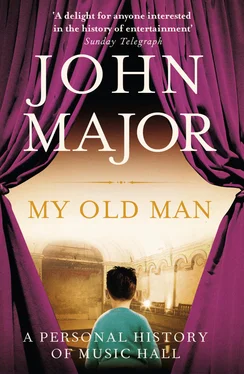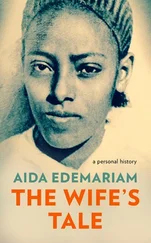Tories were susceptible too. Lord Randolph Churchill had ‘an almost music hall style of public speaking’, claimed his biographer, while his son Winston, a great admirer of the music hall artiste Dan Leno, was apt to sing ‘old world cockney songs with teddy bear gestures’. Churchill, like the Labour movement, will enter our story again.
Music hall reached its zenith in the 1890s. Vast auditoriums were packed each night in nearly every British town and city, and fourteen million tickets were sold each year. The most popular performers were among the highest-paid and most celebrated figures in the land. ‘I earn more than the Prime Minister,’ noted Little Tich, ‘but I do so much less harm.’ Owners of theatres became rich, and their money and fame gave them an entrée to the Establishment elite. But even as music hall stood unchallenged in its supremacy, the forces that would destroy it were taking shape.
On 28 December 1895, in the dimmed artificial light of Le Grand Café, avenue des Capucines, Paris, a small group of thirty-three individuals were viewing the first public screening of commercial cinema. On the bill were ten one-minute films, the brainchild of two brothers, Auguste and Louis Lumière.
Five years later, at the turn of the century, my father Tom, then twenty-one, entered the profession. For nearly thirty years – the prime of his working life – he earned his living in music hall and variety. His fortunes fluctuated, but in old age, when his health and prosperity were gone, these were the years he remembered with the greatest affection.
In 1902, Tom met Kitty Grant, a vivacious and attractive brunette five years older than him, and they formed a double act, Drum + Major. *When Kitty’s husband, David, died in 1910, she and Tom legalised a relationship that had long been stable. They wrote their own songs, sketches and monologues, and as they became more popular they formed their own revues, with which for over twenty years they toured the country, as well as North and South America. In February 1906, they became founder members of the Variety Artists’ Federation. Playbills reveal that they performed with the greats: Marie Lloyd, George Robey, Florrie Forde, Vesta Tilley and Harry Champion.
These great and happy times ended in tragedy when Kitty died following an onstage accident. My father carried on alone, although not for long. In Tom and Kitty’s show there were two young speciality dancers, ‘Glade and Glen’. ‘Glen’, whose real name was Gwen Coates, a slender imp of a girl, had been asked by the dying Kitty to ‘look after Tom’. And so she did for the next forty years. She was at his side when he died, caring for him as she had done for so long. My mother, the eternal, uncrushable optimist, knew the show must go on, but her smile was never again so bright. When she herself died ten years later, in the dark of a long night, she was in hospital, alone for once, for her death was unexpected. Did she think of Tom? I am sure she did, for she had done so all her life.
When I was born my father was sixty-four, my mother thirty-eight. I was Tom and Gwen’s late child, a just-in-time baby – the one she had hoped for, but feared she would never have. It was not an easy birth: my mother, never robust in health, nearly died, and I became dangerously ill. But we both survived. Most of my mother’s hopes for the future were invested in me, but whatever gifts my parents passed on to their children, the talent to entertain was not among them. My eldest brother, Thomas, had died within hours of his birth. My sister Pat, a fine dancer as a child, was eccentric enough for a stage career, but had no interest in joining the profession. My brother Terry and I were devoid of artistic talent, although I often reflected that my chosen career was akin to show business. Certainly, Prime Minister’s Questions often resembled my father’s description of a raucous night at the Glasgow Empire.
There may have been a good reason for our parents’ lack of disappointment that we failed to follow them onto the stage – at least in my father’s case. At the age of twenty-two he had had a brief liaison with Mary Moss, the wife of a young musician, and in 1901 their son, another Tom, was born. Like his father – our father – Tom became a music hall performer. He had a beautiful tenor voice, but also, I fear, a horrible temper – particularly after a night’s carousing.
Tom Junior appeared onstage in many guises – as ‘Signor Meneghini’, ‘Tom Moss’ or ‘Signor Bassani’. Physically, he was about as unlike my muscular father as it was possible to be: medium height, with a small van Dyke beard, and the plump body of the archetypal tenor. Even when he was past fifty, when I first came to know him, he could sing, and when he did (which was rare), I would listen enraptured as, unaccompanied by music, his voice soared effortlessly to the higher notes. If it had not been for his rebellious, anti-authoritarian nature, his career might have progressed from the shadows into the spotlight. He had the talent, but not the discipline. As my mother put it, ‘Tom doesn’t like being told what to do.’ Truly, Tom was my father’s son.
My parents lived life on a rollercoaster. Alternately well-off and hard-up, in work or out, on top or in difficulty, they inhabited a Micawberish world in which – somehow, sometime – all would be well. But, of course, it hardly ever was. And when the problems piled up, my mother – who had never even heard of Voltaire, let alone read him – echoed Dr Pangloss in Candide in believing that, as disaster followed disaster, it was, no doubt, ‘all for the best in the best of all possible worlds’. She had learned to expect hardship, and when it came knocking at her door she was ready to confront it.
One day, at around the age of nine, I remember rushing home for tea and, in my hurry, throwing open the kitchen door. My father, who was fitting a lightbulb, fell from the stool he was standing on and cracked his head on the tiled floor. Clearly dazed, he was taken off to bed. Although I did not know it at the time, his sight had been fading for many months, as cataracts dimmed his vision; but as it worsened, I was certain that his failing sight was as a direct result of my childhood exuberance. No one ever suggested anything of the kind, but since my feelings of guilt were never known, I was never disabused.
This was but one of many family misfortunes: business failure, debt, bankruptcy, failing health, the loss of our home. The two rented rooms in Brixton in which we found sanctuary were in a house owned by my half-brother Tom, who until then I had never met. My parents had not told me who he really was. My father was too lofty to explain, and my mother would have moved heaven and earth to protect me from ‘that sort of thing’. My father’s health and sight continued to worsen while my mother shielded him from as much as she could, particularly her worries over debt. Her world centred on him, and he accepted her care as his right. In this, if in little else in life, he was a very lucky man. Throughout their travails, my parents had always accepted setbacks with equanimity. Misfortune was nothing new. Shows opened, shows closed. You were top of the bill, or bottom. But tomorrow always held glittering possibilities. That was their philosophy of life.
My father’s health deteriorated further, and he became bedridden. An active man all his life, he now had nothing to do, and nowhere to go. Nor did he have an audience to bring him alive. Here, at least, I could make amends for my nine-year-old clumsiness. I became his audience. He sang the songs he’d known, and recited the monologues he and Kitty had written. ‘The girl I love is up in the gallery,’ he would sing – quietly changing the gender of the lover – and as his eyes watered I’d wonder if he was thinking of Kitty. But when he spoke of his life in the theatre, a smile was never far away. I learned that although Marie Lloyd had a saucy tongue, she had a heart of gold. That Dan Leno and Little Tich were giants of the profession. That Nellie Wallace was ‘ugly but funny’, and Gertie Gitana was lovely in every way. That Nosmo King, in haste to create a stage name for himself, glimpsed the ‘No Smoking’ sign on the carriage windows of a train he was boarding, and never looked back. That Vesta Tilley was the finest cross-dresser of them all – ‘And what’s more,’ said my father, clearly impressed with titles, ‘she became a Lady.’ And so she did.
Читать дальше












